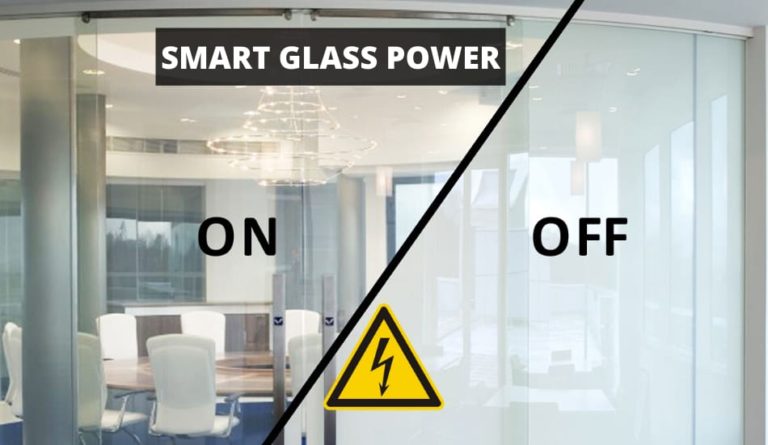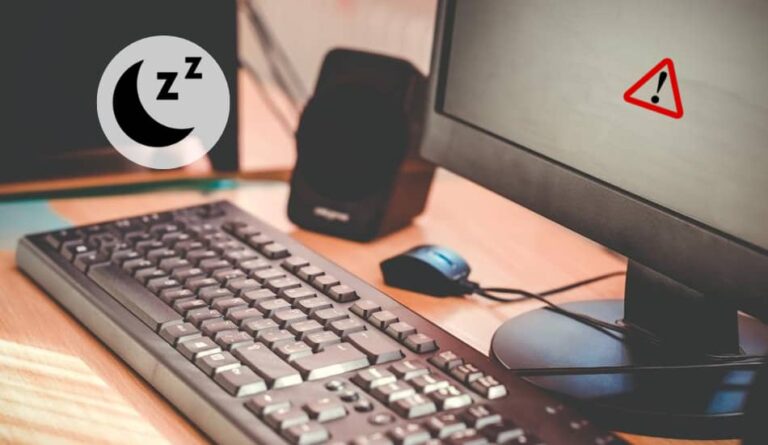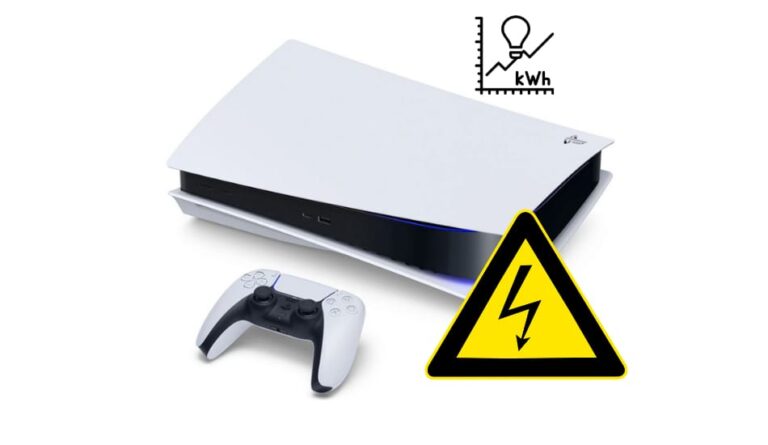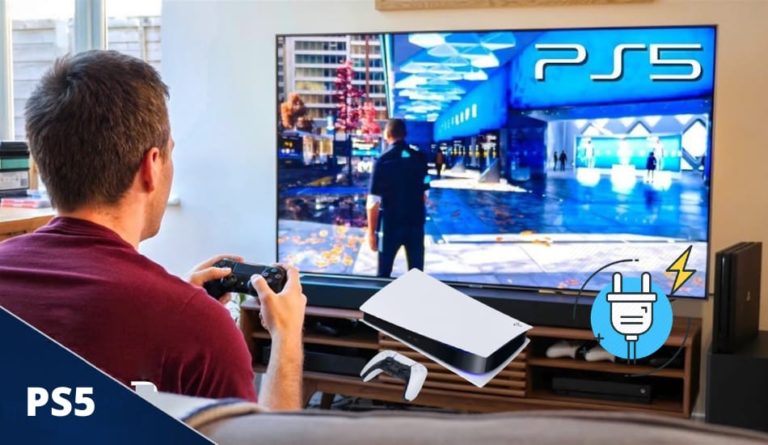How Much Power (Watts) Does a Security CCTV Camera Use?
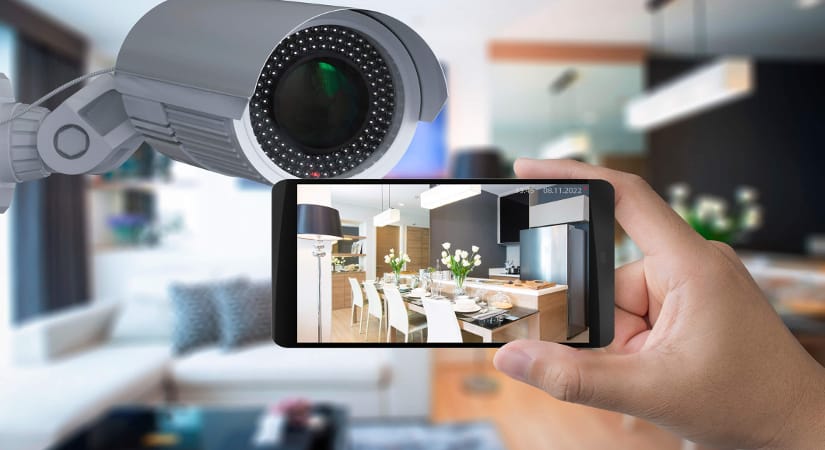
Having a CCTV system in your home can give you protection and security. However, if you decide to install one in your home, you need to consider how much power it will take you to run this system and how it will affect your electric bill. These types of cameras mostly operate 24/7, because you never know when you will need them, so they must be turned on all the time. In this article, we’ll help you to estimate how much power the CCTV security cameras consume and how much it will affect your bill. So, let’s start.
Table of Contents
How Much Power (Watts) Does a Security CCTV Use?
So How Much Power (Watts) Does a Security CCTV Use? A typical CCTV camera consumes between 4 watts to 15 watts of power depending on the model, while the DVR device that is connected with the CCTV camera consumes from 10 to 40 watts. If your CCTV surveillance system is running 24/7, it will cost you around $4 for a month.
CCTV (Closed-circuit television) systems can be seen everywhere these days. That’s why it is important to understand how much power they consume and how it all works. Every CCTV camera needs to have a Digital Video Recorder (DVR) system that records and saves the footage from the camera to the disk. This device also consumes energy (more than the camera itself), and it also needs to operate 24/7. That’s why we need to sum those two together if we want to get the precise power consumption of the CCTV surveillance system.
Best CCTV surveillance camera systems and their power consumption:
| Camera Model: | CCTV Camera [W] | DVR system [W] |
|---|---|---|
| 1. TP-Link Tapo C310 | 5.4 Watts | 10 Watts |
| 2. Ring Floodlight Cam | 15 Watts | 12 Watts |
| 3. Wyze Cam | 4 Watts | 10 Watts |
| 4. Google Nest Cam IQ | 13 Watts | 9 Watts |
| 5. Vivint Outdoor | 7 Watts | 13 Watts |
Every surveillance camera comes with power consumption specifications (label) so you know exactly how much it will consume. For example, this ZOSI C301 IP security camera uses less than 8W.
Keep in mind that some security cameras come with different features such as IP cameras that have IR night vision and pan-tilt, and therefore the power consumption will be different compared to CCTV/IP cameras that don’t have these features.
Also, PoE (powered over Ethernet) cameras can add up also a bit of power consumption. But overall, these security cameras are not energy-consuming if we compare them to other gadgets like computers, TV, or toasters.
Power Consumption Of CCTV Security Camera System
The power consumption of a security camera depends on the model and the specifications. If your security CCTV camera is recording HD quality footage for a longer period of time, it will consume more energy. Some models come with a lot of additional features that consume even more power such as night vision mode, motion detectors, or additional light.
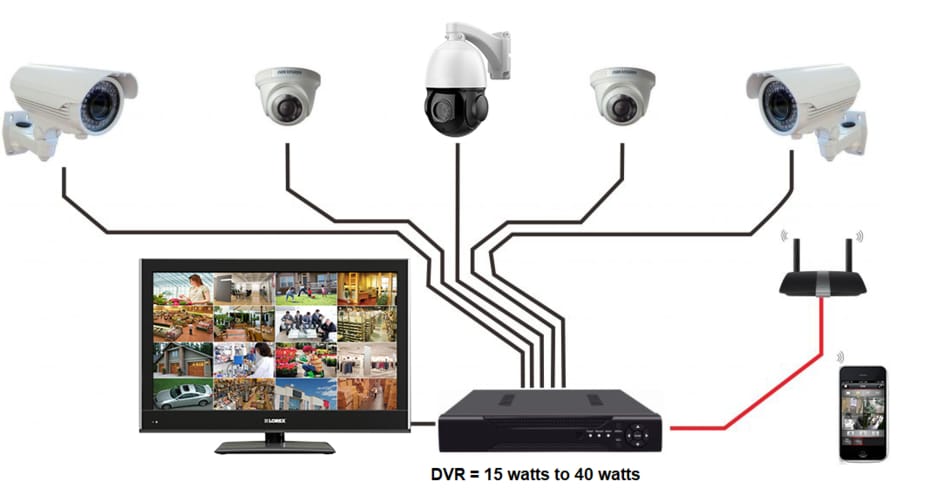
The easy way to determine how much power your CCTV system consumes is by using the camera wattage and multiplying it with the number of hours that the camera was used per day. Divide that number by 1000 and you will get kilowatt per hour (kWh). The formula is the following:
- Device (Camera) wattage x hours per day = Watt-hours per day (Wh)
- Device (Camera) usage per day (Wh) / 1000 = Camera usage in kWh
- Device (Camera) usage per day (kWh) x 30 days = Monthly usage (kWh/month)
Note! If you have multiple cameras, just calculate each one separately and add them up. The total sum should include each CCTV camera and DVR device.
The average electricity consumption in the US is around 13 cents per kWh. If your CCTV camera consumes 7 watts, and you have 3 of them in your house together with a 30 watts DVR that you use 24/7, it will cost you $4,7 per month.
Does DVR/NVR Use a Lot of Electricity?
Digital Video Recorders (DVRs) typically consume between 15 watts to 40 watts while a non-DVR HD consumes around 8 to 15 watts. For example, some models such as Hikvision DVRs use 40 watts and it runs on 100~240VAC, 6.3A. Also, these devices are running 24/7 and they are extremely important for the camera system to function properly and that’s why they consume more power down the road.
As we told, DVRs consume slightly more power than security cameras. Certain types of CCTV cameras and their number, monitoring time, and ambient temperature in which they operate can ultimately lead to an increase in your electricity bill.
Therefore, it is important to take some measures to reduce energy consumption, such as choosing reliable video cameras and security systems, quality cables, and adjusting the parameters of your cameras to save energy by setting activation only after motion is detected.
Calculating CCTV Camera Power Consumption
All devices, including CCTV cameras, come with a specification label. On that label, you will see the power supply and power consumption of that device. Keep in mind that power consumption can sometimes be listed in terms of voltage (V) and amperes (A) which can be very easily calculated then.
Here we will use an example. If we buy a CCTV surveillance camera that has a power supply of 10 VDC/500mA, we can easily get the power consumption and how much it will cost us to run. 10 VDC is the camera’s voltage (V) and the 500 mA is the amperage (A). Now to calculate the power consumption (P), we need to multiply the voltage (V) with the amperage (A). The first step is to convert 500 mA to A. We’ll do this by dividing it by 1000, and we will have 0.5 A.
The formula is the following:
- P = V x A [W]
- P = 10 x 0.5 = 5 [W]
Here, you can use the free Calculator for CCTV Cameras & DVRs Power Consumption.
Now that we have how many watts our surveillance camera consumes, we can calculate how much it will cost us to run it 24/7. Keep in mind that some CCTV cameras have extra functions such as IR night vision, IP, etc. and that they will consume about 2 to 4 W more power than usual.
If we take the average electricity rate in the U.S. that is 13 cents per kWh and we sum it with 5 watts (CCTV camera power consumption), we’ll get that it will cost us 48 cents to run a camera per month (without a DVR system).
But we also need to consider is that CCTV cameras work together with a DVR/NVR system that consumes even more power than a camera, especially if they are turned on 24/7. But in general, it isn’t a large amount of power compared to other devices in your house. This isn’t a big power consumption, but if you are using it for large business then it can be a significant cost where you will need a lot of cameras and other equipment.
Best way to know how much power your CCTV camera system will consume is to use a Kill A Watt Meter. By using this device, you will know precisely how much it will cost you to run this security system in your home or office.
What Power Supply Do I Need For CCTV Camera?
Most CCTV surveillance cameras use 12V DC power supply voltage. In other words, you need a 12V adapter to meet the power supply needs for your security camera. But not all CCTV cameras use DC power, there are also models with AC power that are available on the market.
If you want to know How Much Power (Watts) Does a Doorbell Use, read this article.
How To Reduce Power Consumption Of CCTV Cameras?
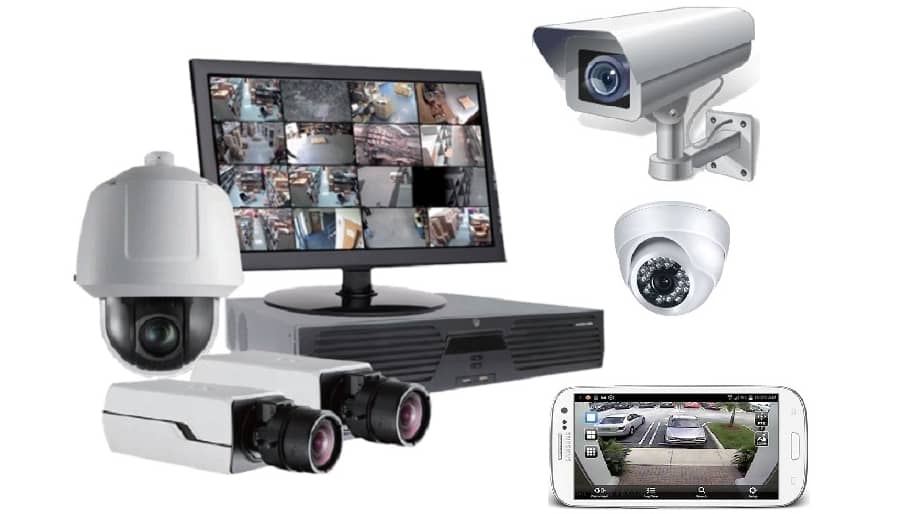
Although a typical home surveillance CCTV camera doesn’t consume much power if we compare it to other house gadgets, in the long-term it certainly affects your electric bill and carbon footprint. The best way to reduce the power consumption of your CCTV system is to adjust the camera settings.
You could turn off certain functions and record them at a certain period of time instead of 24/7. Another way is to buy some basic models that don’t have ultra HD cameras so the power consumption will be less.
It’s also important to make some quality measures to reduce power consumption, for example, buy quality wires, and cables, to save power. You can also buy solar-powered CCTV cameras that can work by using solar energy.
Does CCTV Camera Work Without Electricity?
Like any other electrical device and gadget, a CCTV surveillance camera and system depend on electricity. Although there are some CCTV camera models that have a backup system that is able to record a short period of time without the main power line, it then uses additional batteries but only for a certain period of time.
Therefore, to have a backup system it is recommended that you connect your CCTV system to the generator or battery so it can record even when there is no electricity from the main power line. While this investment will cost you a little more, it is up to you to assess how important it is to you and whether it is really needed.
Related Article: How Much Electricity (Power) Does A Wi-Fi Router Use
Final Thoughts
Although home CCTV security systems consume only a small portion of your energy bill, it’s good to know roughly how much extra it will cost you per month. Therefore, in this article, we have described in detail what the CCTV system consists of and how much it consumes. The cameras are mostly on 24/7 because we don’t know when we’ll need them so it’s important that they’re always on.
Also what we have learned is that we need a DVR system where the footage will be saved, and those systems also consume additional energy. I hope this article has helped you get a better insight into spending, and that you will be able to take advantage of it.



